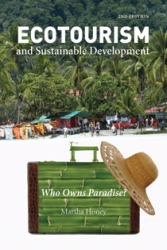
Martha Honey
Martha Honey is the Co-Founder and Director Emeritus of the Center for Responsible Travel (CREST). Martha led CREST as the Executive Director for 16 years before transitioning to her project-based role of Director Emeritus in 2019. Over the last two decades, Martha has written and lectured widely on ecotourism, impact tourism, cruise and resort tourism, coastal and marine tourism, climate change, and certification issues. Her books include Coastal Tourism, Sustainability, and Climate Change in the Caribbean, Vol. 1 & 2, and Marine Tourism, Climate Change, and Resilience in the Caribbean, Vol. 1 & 2 (Business Expert Press, 2017), Ecotourism and Sustainable Development: Who Owns Paradise? (Island Press, 1999 and 2008), and Ecotourism and Certification: Setting Standards in Practice (Island Press, 2002). She is the Executive Producer of CREST’s film, Caribbean ‘Green’ Travel: Your Choices Make a Difference, released in May 2016. Most recently, she has been an editor and author of a new study on cruise tourism, published in Spanish as Por el Mar de las Antillas: 50 Años de Turismo de Cruceros en el Caribe and in English as Cruise Tourism in the Caribbean: Selling Sunshine. Previously, Martha worked for 20 years as a journalist based in East Africa and Central America. She holds a Ph.D. in African history from the University of Dar-es-Salaam, Tanzania.


